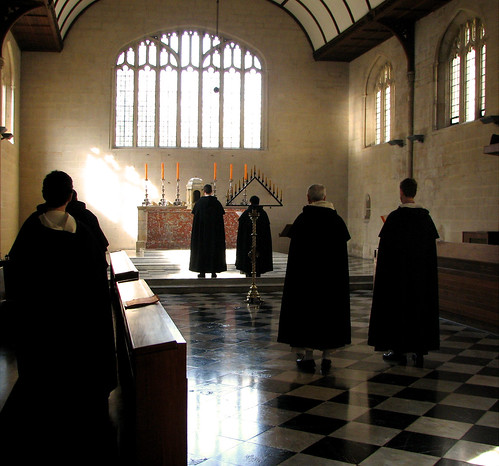One of the half-jest bestemmie that B is so fond of concerns today, Holy Thursday as "the day God turned himself into a loaf of bread." Despite his two college degrees, he retains the voice and view of the Calabrese peasant. Magical, and formally heretical, rather than sacramental --in the eyes of the theologically pointy-headed-- he nonetheless gets to the heart of the matter.
Holy Week is also the time for the celebration of Tenebrae, shadows. It is a specially solemn performance of the Office of Matins. The psalms are about death and betrayal. The readings are chanted from the Lamentations of Jeremiah. And fifteen candles are lit and then slowly extinguished until all that is left is darkness and silence.
Andrew Sullivan's disappointingly trite plea for a "pure and simple" kind of Jesus morals religion is well unravelled here. What strikes me is his focus on power and its renunciation. What folks like this often fail to notice is that once he stepped out into the public world, after his baptism and time in the desert, until the moment when he was arrested, Jesus never once gave up his authority or his power. Even then, it was his choice; he knew it was coming and did not try to escape (though --Mt 26.39--he wished he could.) He was always in charge. No one on earth was master of the "Lord and Master" (John 13.14).
The foot-washing in which that phrase occurred is instructive. He did perform a task for his disciples that was beneath him. But it was only because it was beneath him that it was noteworthy. And it was not an act of submission to them; on the contrary, it only strengthened his position as Lord and Master. He chose to do it. No one required it of him.
When a scandalized Peter refused to accept this confusing gesture, Jesus did not sympathize, empathize, identify with or enter into dialogue with him; He made it authoritatively and magisterially clear to him: Take part or get out. (Jn 13.8)
Power is not simple. Nor was Jesus. Nor is darkness. Nor is bread.





1 comment:
If 'He who is all Truth and all Power' says "This is my body — this is my blood" in an empty [kenosis'd] tent, does transubstantiation still occur?
Post a Comment